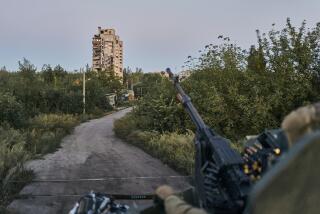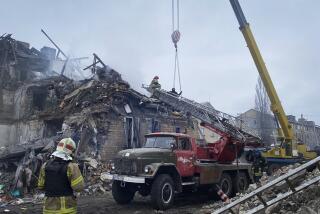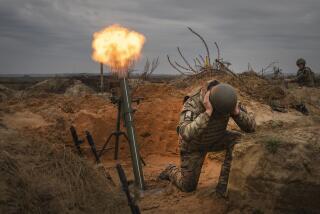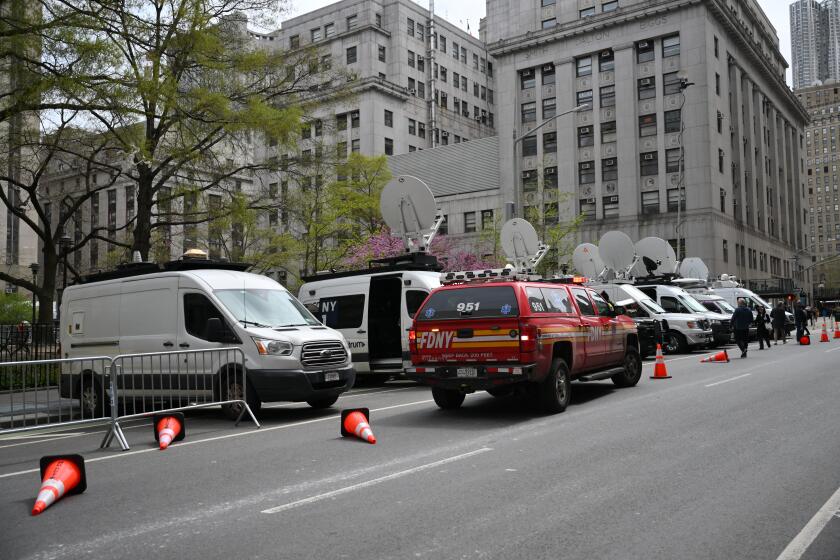Anarchy spreads in eastern Ukraine, team of European analysts detained
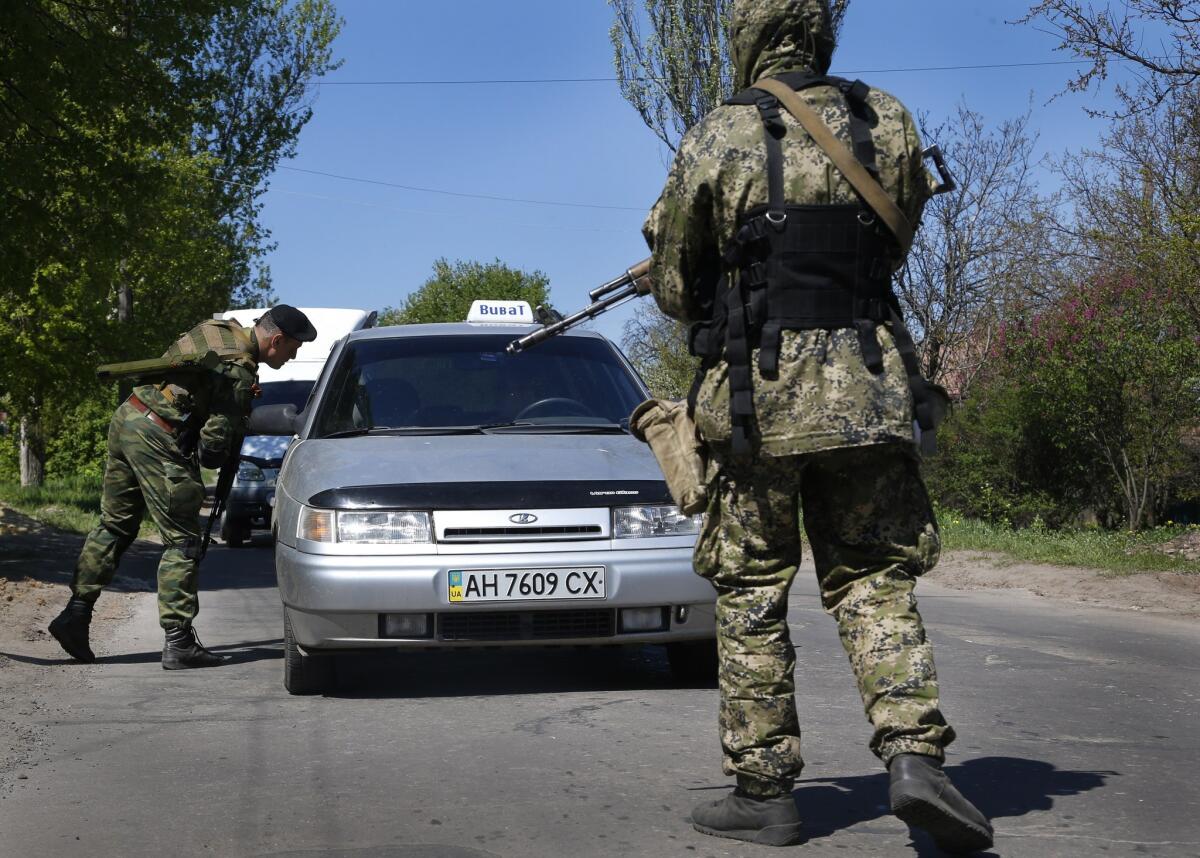
Separatist gunmen occupying the volatile eastern Ukrainian city of Slovyansk detained a 13-member team of military analysts from the Organization for Security and Cooperation in Europe Friday in defiance of international agreements signed by Russia and Ukraine.
The German-led OSCE team was on a mission to evaluate a potential security threat and operating under a treaty provision known as the Vienna Document, which obliges the OSCE’s 57 member states to “consult and cooperate in case of unusual military activity or increasing tensions.”
Slovyansk has emerged as the most defiant of a dozen towns and cities in eastern Ukraine where government buildings have been occupied by armed militants demanding independence. Some have proclaimed allegiance to Russia, and others demand the right to determine their own economic and foreign policies.
Ukraine’s interim leaders in Kiev accuse the Kremlin of fomenting the unrest as a premise to invade and seize more territory from Ukraine in the manner it did in Crimea two months ago. The Crimean peninsula was annexed to Russia last month, two days after a referendum on secession from Ukraine that has been condemned worldwide as a violation of international law.
The referendum came after pro-Russian rebels, some wearing Russian uniforms but without insignia, took over government buildings, including the Crimean parliament, which voted to dismiss the government and schedule the independence vote.
Since that vote, similar unrest has erupted in eastern Ukraine, the latest of which is centered in the Donetsk region.
Gunmen claiming loyalty to the proclaimed “Donetsk Republic” stopped a bus carrying the OSCE mission as it entered Slovyansk on Friday, said Ukrainian Interior Ministry spokesman Yevhen Perebyinis. He told reporters in Kiev that the team was believed to be “captured by terrorists.”
OSCE said via Twitter that it had lost communication with the team around midday and issued subsequent tweets identifying the nationalities of the observers and explaining their mission. The agency said the team consists of four Germans, a Czech, a Pole, a Dane and a Swede under escort by five Ukrainian soldiers.
A staff advisor of the Helsinki Commission, the U.S. government liaison with the OSCE, said the Vienna-based agency had been in touch with its detained observers who were being held at the Slovyansk security service office occupied by the armed Moscow loyalists. The OSCE administrators were told by team members that they expected to be released but had to wait for the separatists “to consult with the competent organs of the Russian Federation,” said the advisor, who spoke on condition he not be identified because he wasn’t authorized to speak for the organization.
Russian President Vladimir Putin and Foreign Minister Sergei Lavrov have repeatedly denied that the Kremlin is instigating or directing the occupations that have disrupted government functions in the eastern areas with large minorities of Russians and Russian-speakers. Kremlin officials and state-run Russian media have portrayed the separatist actions in eastern Ukraine as a grass-roots movement concerned that its culture and language are at risk under the leadership in Kiev.
Ukrainian President Viktor Yanukovich fled his Kiev residence on Feb. 21 after a rebellion by Europe-leaning Ukrainians in the western and central regions. They were angered by his decision to abandon an economic association agreement with the European Union. Opposition politicians took over government operations after Yanukovich’s allies in the Party of Regions fled or defected to the protesters’ side. Moscow derides the interim Kiev leadership as “coup installed” and lacking any authority to decide Ukraine’s affairs.
OSCE deployed its Special Monitoring Mission shortly after Russian troops began taking over key government, military and communications sites in Crimea within days of Yanukovich’s decision to flee and take refuge in Russia. The monitors were barred from Crimea by the Russian armed forces now in control of the newly annexed peninsula. But Russia was compelled to grant OSCE access at a diplomatic meeting in Geneva earlier this month that identified steps to “de-escalate” the Ukraine crisis.
In its latest report on the security situation across Ukraine, the OSCE monitors described the eastern Donetsk and Luhansk regions as “tense” due to the political polarization inflicted there by the pro-Russia militants and local citizens’ “fears of possible activities of armed opponents of the [Kiev] government.”
But in Kharkiv, Ukraine’s second-largest city, which also has been the scene of struggle between separatists and supporters of the Ukrainian government, the OSCE met with deputies of the regional assembly. The local politicians told the monitors that they wanted to defuse the standoff there by securing the status of Russian as an official language and banning political parties that advocate neo-Nazism or separatism.
The monitors also reported that roadblocks had been removed from two towns in the Donetsk region, Makiyivka and Debaltseve, because of “a lack of volunteers to man the barricades, as people were afraid for their personal safety.”
Ukrainian troops moved against the armed separatists in several eastern areas this week after the bodies of two government loyalists, including a city councilman from Horlivka, were found dumped in a river, each bearing marks of torture. Five of the pro-Russian gunmen have been reported killed in the government’s “anti-terrorist operation.”
OSCE said in its report from Dnepropetrovsk that local authorities had detained two members of the pro-government National Defense force and were holding them on suspicion of espionage.
In Odessa, the Black Sea port that straddles the ethnic fault line through Ukraine, supporters of the government controlled check points to defend the city from infiltration by separatists, the OSCE reported.
Western cities including Lviv, Ivano-Frankivsk and Chernivtsi were calm, the observers reported, and in Kiev “the process of removing the barricades around Maidan square continued.”
Russian leaders and the separatists in eastern Ukraine have refused to abide by the Geneva agreement’s provision for all illegally armed groups to surrender their weapons, complaining that the Maidan scene of the three-month rebellion against Yanukovich remains in the hands of “self-defense forces” that Moscow contends are illegal.
The OSCE report also took note of concerns in western Ukraine of the approaching May Day and Victory Day holidays, which are celebrated more ardently by those nostalgic for the era of Soviet unity than by Ukrainians who feel liberated from Moscow’s domination.
Twitter: @cjwilliamslat
More to Read
Start your day right
Sign up for Essential California for news, features and recommendations from the L.A. Times and beyond in your inbox six days a week.
You may occasionally receive promotional content from the Los Angeles Times.
